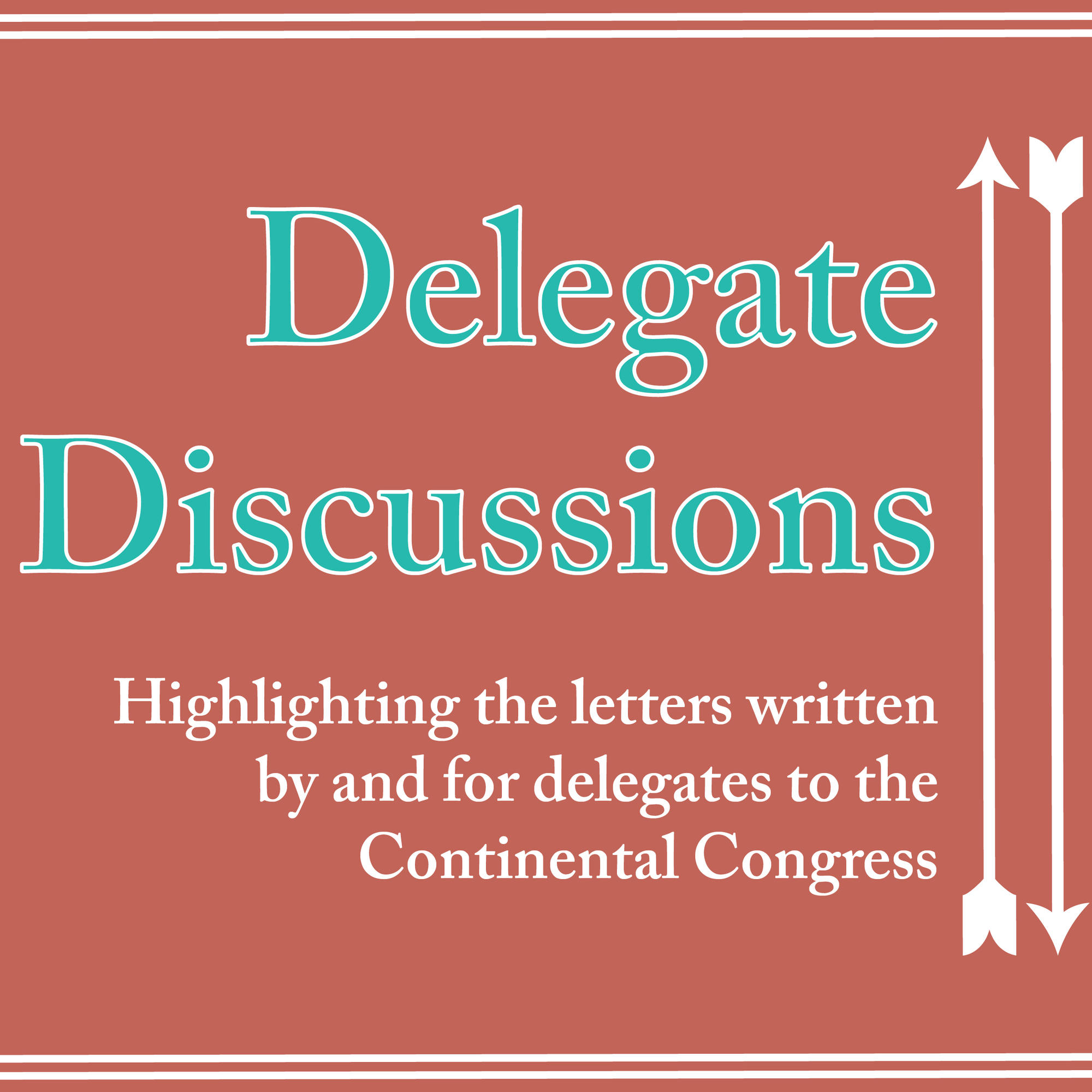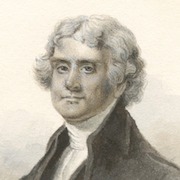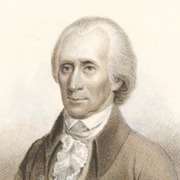 On December 20, 1787, Thomas Jefferson wrote to his friend James Madison. Living in Paris as United States Minister Plenipotentiary to France, Jefferson did not participate in the Constitutional Convention.
On December 20, 1787, Thomas Jefferson wrote to his friend James Madison. Living in Paris as United States Minister Plenipotentiary to France, Jefferson did not participate in the Constitutional Convention.
About a page and a half in to the letter, Jefferson remarked: "The season admitting only of operations in the Cabinet, and these being in a great measure secret, I have little to fill a letter. I will therefore make up the deficiency by adding a few words on the Constitution proposed by our Convention."

After a short list of the things Jefferson liked about the new Constitution, his "few words" continued with the list of things he did not like, beginning with the lack of a bill of rights. In honor of the 225th anniversary of the ratification of the Bill of Rights (December 15, 1791), let's examine the words of Jefferson, James Wilson, and other signers of the Declaration of Independence who fell on both sides of the argument over whether a bill of rights should be included in the U.S. Constitution.
Of the 56 delegates who signed the Declaration of Independence, 43 were alive when the United States Constitution was signed in 1787 (and six actually signed it). Eight signers of the Declaration of Independence were delegates to the Constitutional Convention: Roger Sherman (Connecticut), George Clymer (Pennsylvania), Benjamin Franklin (Pennsylvania), Robert Morris (Pennsylvania), James Wilson (Pennsylvania), George Read (Delaware), George Wythe (Virginia, left early), Elbridge Gerry (Massachusetts, did not sign). Thirteen signers of the Declaration participated in their respective states' ratification conventions: Wilson, Thomas McKean, and Benjamin Rush (Pennsylvania); John Witherspoon (New Jersey); Sherman, Samuel Huntington, and Oliver Wolcott (Connecticut); Gerry, Samuel Adams, and John Hancock (Massachusetts); William Paca (Maryland); Edward Rutledge (South Carolina); and Wythe (Virginia). Eight more signers died before the ratification of the Bill of Rights on December 15, 1791; notably, Benjamin Franklin died in April 1790. Like Jefferson, John Adams was a foreign minister during the Constitutional Convention. But, his signature is on each of the known copies of the Bill of Rights (fourteen were produced), as Vice President of the United States and President of the Senate.
 Elbridge Gerry
Elbridge Gerry
Gerry signed the Declaration of Independence a few months after his colleagues from Massachusetts, and also signed the Articles of Confederation in 1778. In 1787, he was one of three delegates to the Constitutional Convention who refused to sign the U.S. Constitution (the others were George Mason and Edmund Randolph).
Debates in the Constitutional Convention, September 12, 17871: "Col. MASON ... wished the plan had been prefaced with a bill of rights, and would second a motion, if made for the purpose. it would give great quiet to the people, and with the aid of the state declarations, a bill might be prepared in a few hours. Mr. GERRY concurred in the idea, and moved for a committee to prepare a bill of rights. Col. MASON seconded the motion. Mr. SHERMAN was for securing the rights of the people, where requisite. The state declarations of rights are not repealed by thie Constitution, and, being in force, are sufficient. There are many cases, where juries are proper, which cannot be discriminated. The legislature may be safely trusted."
Letter to President of Senate (Samuel Adams) and Speaker of House of Representatives (James Warren) of Massachusetts, 18 October 17872: "It was painful for me, on a subject of such national importance, to differ from the respectable members who signed the constitution. But conceiving as I did, that the liberties of America were not secured by the system, it was my duty to oppose it. My principal objections to the plan, are, that there is no adequate provision for a representation of the people—that they have no secutiy for the right of election—that some of the powers of the legislature are ambiguous, and others indefinite and dangerous—that the executive is blended with, and will have undue influence over, the legislature—that the judicial department will be oppressive—that the treaties of the highest importance may be formed by the president with the advice of two-thirds of a quorum of the senate—and that the system is without the security of a bill of rights. These objections which are not local, but apply equally to all the states."
 James Wilson
James Wilson
A prominent lawyer, Wilson was a member of the Committee of Detail, which drafted the Constitution (his first draft is at the Historical Society of Pennsylvania). He spoke frequently during the Constitutional Convention, and fellow delegate Benjamin Rush recalled that, "his mind while he spoke, was one blaze of light." Wilson led the ratification movement in Pennsylvania, which became the second state to adopt the Constitution.
Speech at Pennsylvania State House, 6 October 1787: "When the people established the powers of legislation under their separate governments, they invested their representatives with every right and authority which they did not in explicit terms reserve; and therefore upon every question respecting the jurisdiction is efficient and complete. But in delegating federal powers, another criterion was necessarily introduced, and the congressional power is to be collected, not from tacit implication, but from the positive grant expressed in the instrument of the union. Hence, it is evident, that in the former case everything which is not reserved is given; but in the latter the reverse of the proposition prevails, and everything which is not given is reserved. This distinction being recognized, will furnish an answer to those who think the omission of a bill of rights a defect in the proposed constitution; for it would have been superfluous and absurd to have stipulated with a federal body of our own creation, that we should enjoy those privileges of which we are not divested, either by the intention or the act that has brought the body into existence. For instance, the liberty of the ptress, which has been a copious source of declamation and opposition--what control can proceed from the Federal government to shackle or destroy that sacred palladium of national freedom? If, indeed, a power similar to that which has been granted for the regulation of commerce had been granted to regulate literary publications, it would have been as necessary to stipulate that the liberty of the press should be preserved inviolate, as that the impost should be general in its operation. ... In truth, then, the proposed system possesses no influence whatever upon the press, and it would have been merely nugatory to have introduced a formal declaration upon the subject--nay, that very declaration might have been construed to imply that some degree of power was given, since we undertook to define its extent."
Speech in Pennsylvania Ratifying Convention, 28 November 1787: "I cannot say, Mr. President, what were the reasons of every member of that Convention for not adding a bill of rights. I believe the truth is, that such an idea never entered the mind of many of them. I do not recollect to have heard the subject mentioned till within about three days of the time of our rising; and even then, there was no direct motion offered for any thing of the kind. I may be mistaken in this; but as far as my memory serves me, I believe it was the case. A proposition to adopt a measure that would have supposed that we were throwing into the general government every power not expressly reserved by the people, would have been spurned at, in that house, with the greatest indignation. Even ina single government, if the powers of the people rest on the same establishment as is expressed in this Constitution, a bill of rights is by no means a necessary measure. In a government possessed of enumerated powers, such a measure would be not only unnecessary, but preposterous and dangerous. Whence comes this notion, that in the United States there is no security without a bill of rights? Have the citizens of South Carolina no security for their liberties? They have no bill of rights. Are the citizens on the eastern side of the Delaware less free, or less secured in their liberties, than those on the western side? The state of New Jersey has no bill of rights. The state of New York has no bill of rights. The states of Connecticut and Rhode Island have no bill of rights. I know not whether I have exactly enumerated the states who have not thought it necessary to add a bill of rights to their constitutions; but this enumeration, sir, will serve to show by experience, as well as principle, that, even, in single governments, a bill of rights is not an essential or necessary measure. But in a government consisting of enumerated powers, such as is proposed for the United States, a bill of rights would not only be unnecessary, but, in my humble judgment, highly imprudent. In all societies, there are many powers and rights which cannot be particularly enumerated. A bill of rights annexed to a constitution is an enumeration of the powers reserved. If we attempt an enumeration, every thing that is not enumerated is presumed to be given. The consequence is, that an imperfect enumeration would throw all implied power into the scale of the government, and the rights of the people would be rendered incomplete. On the other hand, an imperfect enumeration would throw all implied power into the scale of the government, and the rights of the people would be rendered incomplete. On the other hand, an imperfect enumeration of the powers of government reserves all implied power to the people; and by that means the constitution becomes incomplete. But of the two, it is much safer to run the risk on the side of the constitution; for an omission in the enumeration of the powers of government is neither so dangerous nor important as an omission in the enumeration of the rights of the people."
Speech in Pennsylvania Ratifying Convention, December 11, 17873: "I view the states as made for the people, as well as by them, and not the people as made for the states; the people, therefore have a right, whilst enjoying the undeniable powers of society, to form either a general government, or state governments, in what manner they please, or to accommodate them to one another, and by this means preserve them all. This, I say, is the inherent and unalienable right of the people; and as an illustration of it, I beg to read a few words from the Declaration of Independence, made by the representatives of the United States, and recogznied by the whole Union. 'We hold these truths to be self-evident, that all men are created equal; that they are endowed by their Creator with certain unalienable rights; that among these are life, liberty, and the pursuit of happiness; that, to secure these rights, governments are instituted among men, deriving their just powers from the consent of the governed; that, whenever any form of government becomes destructive of these ends, it is the right of the people to alter or abolish it, and institute new government, laying its foundation on such principles, and organizing its powers in such forms, as to them shall seem most likely to effect their safety and happiness.' This is the broad basis on which our independence was placed: on the same certain and solid foundation this system is erected. State sovereignty, as it is called, is far from being able to support its weight. Nothing less than the authority of the people could either support it or give it efficacy."
 Thomas Jefferson
Thomas Jefferson
As mentioned, Jefferson served as Minister to France from 1785-1789. He wrote a number of letters from Paris to his friends across the Atlantic about the Constitution, though his letter to Madison is arguably the most well-known.4
Letter to James Madison, 20 December 1787: "I will now add what I do not like. First the omission of a bill of rights providing clearly and without the aid of sophisms for freedom of religion, freedom of the press, protection against standing armies, restriction against monopolies, the eternal and unremitting force of the habeas corpus laws, and trials by jury in all matters of fact triable by the laws of the land and not by the law of Nations. To say, as Mr. Wilson does that a bill of rights was not necessary because all is reserved in the case of the general government which is not given, while in the particular ones all is given which is not reserved might do for the Audience to whom it was addressed, but is surely gratis dictum, opposed of the clause of our present confederation which had declared that in express terms. It was a hard conclusion to say because there has been no uniformity among the states as to the cases triable by jury, because some have been so incautious as to abandon this mode of trial, therefore the more prudent states shall be reduced to the same level of calamity. It would have been much more just and wise to have concluded the other way that as most of the states had judiciously preserved this palladium, those who had wandered should be brought back to it, and to have established general right instead of general wrong. Let me add that a bill of rights is what the people are entitled to against every government on earth, general or particular, and what no just government should refuse, or rest on inference."
Letter to C.W.F. Dumas, 12 February 1788: "With respect to the new government, 9. or 10. states will probably have accepted it by the end of this month. The others may oppose it. Virginia I think will be of this number. Besides other objections of less moment, she will insist on annexing a bill of rights to the new constitution, i.e. a bill wherein the government shall declare that 1. Religion shall be free. 2. Printing presses free. 3. Trials by jury preserved in all cases. 4. No monopolies in commerce. 5. No standing army. Upon receiving this bill of rights, she will probably depart from her other objections; and this bill is so much of the interest of all the states that I presume they will offer it, and thus our constitution be amended and our union closed by the end of the present year. In this way there will have been opposition enough to do good, and not enough to do harm."
Letter to James Madison, 31 July 1788: "I sincerely rejoice at the acceptance of our new constitution by nine states. It is a good canvas, on which some strokes only want retouching. What these are, I think are sufficiently manifested by the general voice from North to South, which calls for a bill of rights. It seems pretty generally understood that this should go to Juries, Habeas corpus, Standing armies, Printing, Religion and Monopolies. I conceive there may be difficulty in finding general modification of these suited to the habits of all the states. But if such cannot be found then it is better to establish trials by jury, the right of Habeas corpus, freedom of the press and freedom of religion in all cases, and to abolish standing armies in time of peace, and Monopolies, in all cases, than not to do it in any. The few cases wherein these things may do evil, cannot be weighed against the multitude wherein the want of them will do evil. ... A declaration that the federal government will never restrain the presses from printing any thing they please, will not take away the liability of the printers for false facts printed. The declaration that religious faith shall be unpunished, does not give impunity to criminal acts dictated by religious error. The saying there shall be no monopolies lessens the incitements to ingenuity, which is spurred on by the hope of a monopoly for a limited time, as of 14. years; but the benefit even of limited monopolies is too doubtful to be opposed to that of their general suppression. If no check can be found to keep the number of standing troops within safe bounds, while they are tolerated as far as necessary, abandom them altogether, discipline well the militia, and guard the magazines with them. More than magazine-guards will be useless if few, and dangerous if many. No European nation can ever send against us such a regular army as we need fear, and it is hard if our militia are not equal to those of Canada or Florida. My idea then is, that tho' proper exceptions to these general rules are desireable and probably practicable, yet if the exceptions cannot be agreed on, the establishment of the rules in all cases will do ill in very few. I hope therefore a bill of rights will be formed to guard the people against the federal government, as they are already guarded against their state governments in most instances."
Letter to James Monroe, 9 August 1788: "This constitution forms a basis which is good, but not perfect. I hope the states will annex to it a bill of rights securing those which are essntial against the federal government; particularly trial by jury, habeas corpus, freedom of religion, freedom of the press, freedom against monopolies, and no standing armies. I see so general a demand of this that I trust it will be done."
Letter to Francis Hopkinson, 13 March 1789: "What I disapproved from the first moment also was the want of a bill of rights to guard liberty against the legislative as well as executive branches of the government, that is to say to secure freedom in religion, freedom of the press, freedom from monopolies, freedom from unlawful imprisonment, freedom from a permanent military, and a trial by jury in all cases determinable by the laws of the land."
Letter to James Madison, 15 March 1789: "The Declaration of rights is like all other human blessings alloyed with some inconveniences, and not accomplishing fully it's object. But the good in this instance vastly overweighs the evil. ... Half a loaf is better than no bread. If we cannot secure all our rights, let us secure what we can."
 Richard Henry Lee
Richard Henry Lee
Lee was not a delegate to the Constitutional Convention, but he would go on to become a United States Senator from Virginia after the adoption of the Constitution.
Letter to Samuel Adams, 5 October 1787: "Having long toiled with you my dear friend in the Vineyard of liberty, I do with great pleasure submit to your wisdom and patriotism, the objections that prevail in my mind against the new Constitution proposed for federal government—which objections I did propose to Congress in form of amendments to be discussed, and that such as were approved might by forwarded to the States with the Convention system. ... So much for the propriety of a Bill of Rights as a necessary bottom to this new system—It is in vain to say that the defects in this new Constitution may be remedied by the Legislature created by it. The remedy, as it may, so it may not be applied—And if it should a subsequent Assembly may repeal the Acts of its predecessor for the parliamentary doctrine is 'quod leges posteriores priores contrarias abrogant' ['that later laws abrogate prior contrary laws']. Surely this is not a ground upon which a wise and good man would choose to rest the dearest rights of human nature."
Letter to Governor Edmund Randolph, 16 October 1787: "Yet there is no restraint, in the form of a bill of rights, to secure (what Dr. Blackstone calls) that residuum of human rights which is not meant to be given up to society, and which, indeed, is not necessary to be given for any good social purpose. The rights of conscience, the freedom of the press, and the trial by jury, are at mercy. ... A constitution, that I may venture to affirm, has, under providence, secured the just liberties of this nation for a long succession of ages; the impartial administration of justice, which secures both our persons and our properties, is the great end of civil society."
Letter to James Gordon, Jr., 26 February 1788: "I presume that foreigners have no business with the nature of our government. Payment of their debts they are entitled to, but no possible reason can be assigned, why these debts may not as well be paid if the proposed constitution was to be so amended, as to secure the just rights and liberties of the people from violation, by a proper bill of rights; to retain the trial by jury in all cases, civil as well as criminal, as directed by the common law; to secure the rights of conscience, and freedom of the press. Will France, Holland, or Spain, be disturbed at our retaining these valuable privileges? or, will they quarrel with us for so amending this new plan, as to put it out of the power of the new rulers to carry ever citizen of the state, by way of appeal, to be tried for every suit for debt, brought by all others than our own state citizens, in the supreme federal court, where distance and expense may ruin multitudes?
1. See Elliot's Debates, Vol. 5, p. 538.
2. See Farrand's Records, Vol. 3, pp. 128-129.
3. For the full text, see Elliot's Debates, Vol. 2, The Debates in the Convention of the State of Pennsylvania, on the Adoption of the Federal Constitution, pp. 453-471.
4. Jefferson forwarded the same text to Uriah Forrest, on December 31, 1787: "Just before I received your favour asking my opinion on our new proposed constitution, I had written my sentiments on the subject fully to my friend Mr. Madison. They concurred so exactly with yours that the communication of them could answer no end but that of shewing my readiness to obey you. I therefore extracted that part from my letter to him, and have reserved it for a good private conveyance which has never offered till now by Mr. Parker. Tho I pretend to make no mystery of my opinion, yet my distance from the scene gives me too much diffidence in my views of it to detail them lengthily and publicly. ... Make what use you please of the contents of the paper, but without quoting it's author, who has no pretension to see what is hidden from others."
More resources on the Bill of Rights:
- Constitutional Rights: Origins and Travels (National Constitution Center)
- Bill of Rights Institute
- America's Founding Documents: The Bill of Rights (National Archives)
Emily Sneff
Edited December 2017

